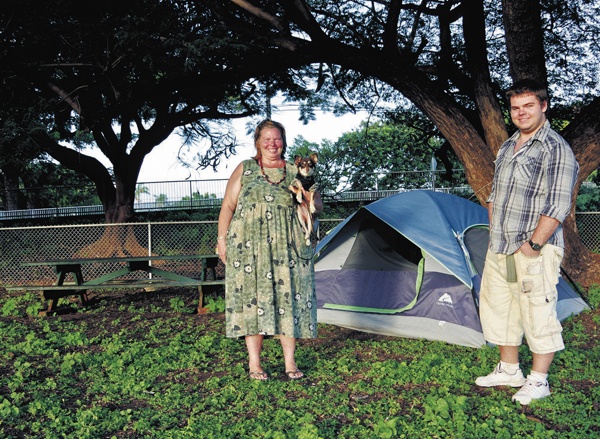WAIMEA —Tereza Kristall wants to be treated fairly. Earlier this month she arrived in Kauai with her 17-year-old son Joshua Kristall-Wagner, looking for a fresh start after having one of her service dogs allegedly threatened while living on Molokai. But
WAIMEA —Tereza Kristall wants to be treated fairly. Earlier this month she arrived in Kauai with her 17-year-old son Joshua Kristall-Wagner, looking for a fresh start after having one of her service dogs allegedly threatened while living on Molokai.
But since moving here, the hearing-impaired woman who relies on her service dog for assistance said she’s had issues here when it comes to people allowing her dog to accompany her.
“Lately I’ve been thinking about leaving the dog at home because its too much stress for me and for her,” said Kristall, whose alleged encounters here include at a campground, shelter and on a bus.
The Americans with Disabilities Act (ADA) protects the rights of people with service animals. But according to the ADA law, when it is not obvious what service an animal provides, the dog owner is only allowed to be asked two questions by the staff at a business: Is the dog a service animal required because of a disability, and what work or task has the dog been trained to perform?
Staff cannot ask about the person’s disability, require medical documentation, require a special identification card or training documentation for the dog.
Kristall’s first encounter, she said, happened on her third night on Kauai.
On her third night staying at the Lucy Wright Campground, Kristall and her son were awakened by a park ranger who was checking camp permits, according to the mother and son. When the ranger saw the dog, named Leilani, he advised them of the no dog rules and told them not to return to the park with Leilani.
When Kristall-Wagner explained that the dog was his mother’s hearing-impaired dog, he said the ranger wouldn’t believe him. According to Kristall-Wagner, the ranger left their tent before he could show him the dog’s credentials. They continue to live at the campground and search for a permanent home.
In response the Department of Parks and Recreation said to sidestep any possible pitfalls in the future, the family should let people know right away when they apply for a permit.
“To avoid any potential conflicts in the future, Tereza and her son were advised to inform the permit clerk about having a service dog when applying for a camping permit and to post the permit in the bag that it was issued in at the bottom corner of the tent,” the department stated.
Kristall has been hearing impaired for more than 40 years, since she was 5 years old. Leilani alerts Kristall of hearing-related events by either jumping up and down or nudging her or pulling on her leash. One time she is said to have even alerted Kristall of an earthquake prior to its occurrence by running around Kristall in a counter-clockwise direction. For those reasons among others, Kristall takes Leilani to public places, such as the public library and on mass transit.
Kristall said she’s had issues with local buses when she wants to sit at the front of the bus with her dog.
She said when she doesn’t have the extra room offered by front of the bus seating, Leilani’s tail tends to stick out into the aisle.
Officials from the Kauai County Transportation Department responded to Kristall’s concerns saying that the drivers are trained upon hire and annually to assist any passenger that requests or requires assistance while accessing a Kauai Bus.
The training consists of how to politely ask the seated passengers to yield the seats to the elderly or people with disabilities, and not to demand it, in order to avoid potential conflicts. They also confirmed that service dogs are welcomed on the Kauai Bus vehicles.
Attorney Louis Erteschik, executive director, Hawaii Disability Rights Center, said that federal law trumps any no-pets rule when it comes to public places.
Kristall and her son also said they could not stay at the Kauai homeless shelter with their service dog.
MaBel Fujiuchi, CEO, Kauai Economic Opportunity (KEO) said Kristall or any other person in need of shelter would be required to fill out an application in order to be considered for the homeless shelter or any other of their more than 20 programs. She is looking into Kristall’s allegations that they were told they couldn’t stay at the shelter with their dog. She is now planning to also check possible inconsistencies between the ADA law and the Fair Housing Guidelines that KEO is required to follow.
For the past four years, another Kauai resident, Madeline Hiraga-Nuccio and her partner Maureen Nuccio-Hiraga, have been traveling about the island with Maureen’s service dog, Sager. They for the most part are pleased with the public’s response to Sager citing only one instance where a hotel worker asked for documentation about the dog’s legitimacy, which isn’t allowed by ADA rules.
• Lisa Ann Capozzi, features and education reporter, can be reached at 245-0452 or lcapozzi@thegardenisland.com.


